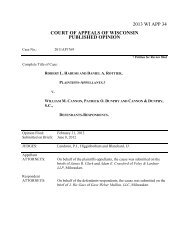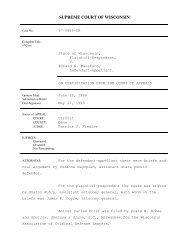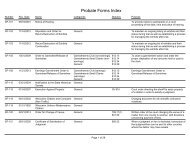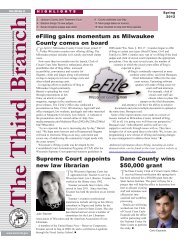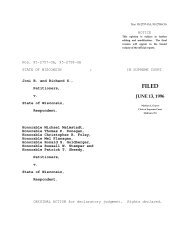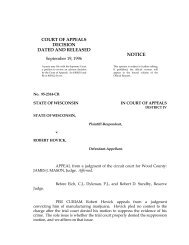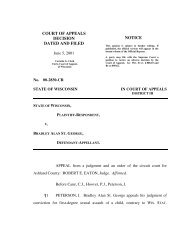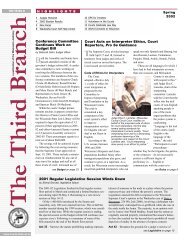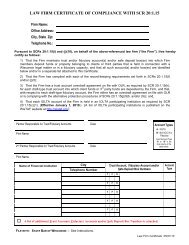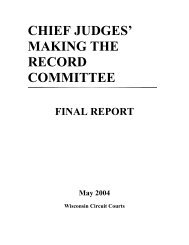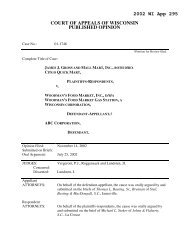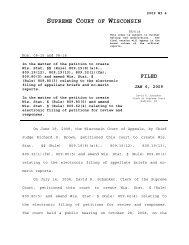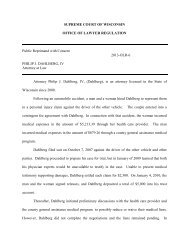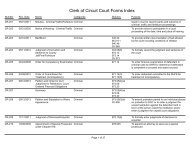Third Branch, srping 2010 - Wisconsin Court System
Third Branch, srping 2010 - Wisconsin Court System
Third Branch, srping 2010 - Wisconsin Court System
Create successful ePaper yourself
Turn your PDF publications into a flip-book with our unique Google optimized e-Paper software.
16Spring<strong>2010</strong>THE THIRD BRANCHTask force continued from page 6Chief Justice Shirley S.AbrahamsonThe 80-member task forcerepresents diverse stakeholdersand policy makers including lawenforcement, legislators, judges,district attorneys, publicdefenders, Department ofCorrections and Department ofHealth Services staff, jailadministrators, state mental healthdirectors, local mental healthproviders, lawyers, non-profitorganizations, consumers,hospital administrators andcounsel, county board membersand county executives, andmental health advocates.At the summit, three circuit court judges served asfacilitators for small-group roundtable discussions. Theywere Richard J. Sankovitz, Milwaukee County; Lisa K.Stark, Eau Claire County; and Gerald P. Ptacek, RacineCounty. Common themes were communication,collaboration, and community partnerships across thecriminal justice and mental health systems.The task force members shared information aboutprograms operating throughout the state that assist withresponses to persons with mentalillnesses who are at risk ofincarceration or in contact withthe criminal justice system,identified gaps in services andcommunication in the mentalhealth and criminal justicesystems, and discussed proposalsfor further development ofmethods and programs that willassist in improving responses.During the roundtable sessionstask force members discussed awide variety of existing programsincluding mobile crisis responseJudge Richard J.Sankovitzteams, crisis resource centers, treatment courts, and mentalhealth assessment centers. Participants also analyzeddifferent types of cross training of mental health, criminaljustice, and first responderprofessionals; encouraged thebreakdown of institutional,legislative, and funding barriers;and reviewed the need forscreening and assessment tools,mental health resource lists, andancillary services includinghousing and employment.The work of the task forcewill continue. One of the goalsof the meeting was that taskJudge Lisa K. Starkforce members learn more aboutother programs, start newrelationships with agencies or entities with which they couldcollaborate, and promote services and programs that willminimize gaps within and across the criminal justice andmental health systems.Chief Justice Shirley S. Abrahamson encouraged taskforce members to considerimplementing programs and ideasdiscussed during the meeting andinitiate further discussions withstakeholders on a local andregional basis.The report will include a list ofexisting programs andinformation-sharing methods,gaps in the criminal justice andmental health systems that wereidentified by task force members,and proposals for innovativeinterventions that will assist in Judge Gerald P. Ptacekimproving responses to personswith mental illnesses who are at risk of incarceration or incontact with the criminal justice system. •RETIREMENTS continued from page 15“Preparing for this year’selection in July of ’09, I startedgetting that same feeling, ‘time tostop.’ And I resisted it because Ididn’t want to quit. I enjoy thejob, but I had no peace until Imade that decision,” he said.Gibbs plans to keep busy inretirement. He will organizecharitable services, such as foodpantries, in Walworth County, andalso will serve as legal counselorat his church. In addition, heJudge Michael S. Gibbsplans to take a long-anticipatedtrip to Israel. It’s a trip his wife, Ellen, has already made andcontinues to rave about.As he prepared to tackle his last few months on the bench,Gibbs reflected on why the job has continued to berewarding after 18 years.“I really liked the challenges and the excitement in theearly years. Then I enjoyed the relationships that you developand that you get so experienced; you just learn so much.”Like many judges, Gibbs said complicated civil caseswere among his favorites. “The attorneys were so good, theissues were complex, the arguments were clever…Civil wasalways the easiest for me because I like the challenge of theintellectual side of it.”Among the more difficult parts of the job was running forelection. But Gibbs said campaigning helped him learn howto relate to the public.“You have to be out there everywhere, at all times. Andstick to your principles. You can’t tell people what they wantto hear. You just have to tell them the truth, and hope theylike that.”In the end, the judge who never intended to become ajudge cannot imagine a different career path. “It was veryrewarding, it was very challenging, and it was an honor,”Gibbs said. “It was an honor to have this position.” •



